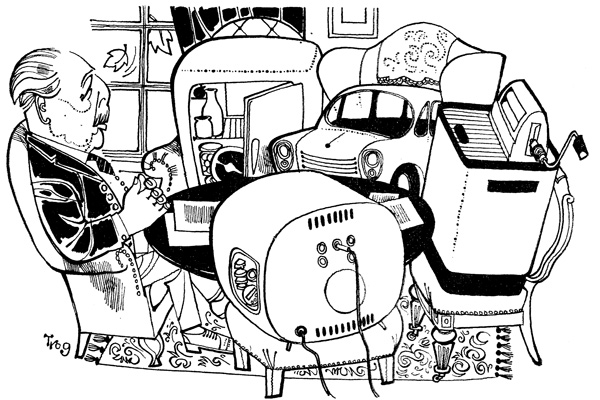This week’s magazine is full to the brim with cracking book reviews. Here is a selection of quotes to whet your appetite.
Sam Leith on Modernity Britain, David Kynaston’s rampaging account of the birth of the consumer age during Harold Macmillan’s premiership:
‘The jacket quotes a passage from late in the book that is an extreme but far from unique instance of the clattering cavalcade style. I wasn’t even alive then but I still feel nostalgic:
Galaxy, Picnic, Caramac (‘Smooth as chocolate … tasty as toffee … yet it’s new all through!’), Knorr Instant Cubes, Bettaloaf, Nimble, New Zealand Cheddar (‘Now I’m sure they’ll grow up firm and strong’), Jacob’s Rose Cream Marshmallow Biscuits, Sifta Table Salt (‘Six Gay Colours’), Player’s Bachelor Tipped, Rothmans King Size, wipe-clean surfaces, Sqezy (‘In the easy squeezy pack’), coloured Lux (‘four heavenly pastel shades of blue, pink, green and yellow, as well as your favourite white’), Fairy Snow, new Tide with double-action Bluinite, Persil (‘washes whiter — more safely’), Nylon, Terylene, Orlon, Acrilan, Tricel, Daks skirts, Jaeger girls, ‘U’ bra by Silhouette (‘Gives You the Look that He Admires’), Body Mist, Mum Rollette, Odo-ro-no, Twink (‘The Home Perm that Really Lasts’), Pakamac, Hotpoint Pacemaker, Pye Portable, Philips Philishave, ‘Get Up To Date — Go Electric!’
Next up, William Leith is pleasantly surprised by Sylvain Tesson’s story of an eremitical journey to Siberia, Consolations of the Forest:
‘Reading Lady Chatterley’s Lover as a hermit, you see it not as an erotic work but a book about the destruction of the environment.’
Then, Tobias Grey tells of dining out in Paris and London in his review of Jonathan Conlin’s Tales of Two Cities: Paris, London and the Birth of the Modern City:
‘It is a surprise to discover the debt Paris owes London for its fine dining and high-kicking nightlife in particular…When a certain Monsieur Duclos took over the reins of the first restaurant to open in Paris, the Hôtel d’Aligre, in 1769, he did not hesitate to advertise ‘nouvelle cuisine à la mode anglaise’.’
The late great W.G. Sebald remains as prolific in death as he did in life. Joanna Kavenna revels in A Place in the Country, the latest book from this literary titan:
‘This brilliantly weird and beautiful book ends with the suggestion that everything Sebald wrote about other authors, and artists, he meant about himself, and about the crazy quest for meaning, and how we persist with it, despite the shadows that slide towards us.’
Timothy Mo waxes lyrical about Bryan Appleyard’s latest novel, Bedford Park. Here’s how Mo begins:
‘Nothing in Bryan Appleyard’s Bedford Park betrays the fact that it is his first period novel: not its deft characterisations, its virtuoso dialogue, its dry and economical wit, or its choice of a narrator and material quite outside the author’s own experience.’
Few things are more enjoyable than Nicky Haslam in arch mood. This week he slams Judith Mackrell’s Flappers: Six Women of a Dangerous Generation:
‘There’s hardly a hint of liveliness in these deathless pages, and despite its title, as a guide to the ‘It-girls’ of so many decades ago, the book falls all a bit — well — flap.’
Julie Kavanagh is thrilling about the tormented ballet dancer Najinsky (shame about Lucy Moore’s new biography):
‘Najinsky lacked the physique and flexibility required by today’s choreographers, but his virtuosity would still be considered extraordinary.’
While reviewing David Ellis’ Memoirs of a Levisite, Rupert Christiansen explains why F.R. Leavis is still revered:
‘For those who were taught by him at Cambridge and came under the spell of his piercing avian gaze, Leavis remains 35 years after his death a vivid and inescapable voice of intellectual conscience. As well as proposing to susceptible young males a fruitful method of intelligent and discriminating reading, he offered them an enchanting moral vision of unimpeachable integrity which steered adroitly between the rocks of political ideology, scientific theory and religious mysticism. But as with the Old Testament prophets he in some sense resembled, you had to be there to feel the full power.’
Ronald Blythe’s A Time by the Sea: Aldeburgh 1955-58 is in print, so we asked the artist Maggi Hambling to recall the time she spent with Blythe in Suffolk. Here’s some of what she said:
‘Ronnie’s minute observation of places, people and plants, his ear for scraps of dialogue and his feeling for poetry and painting make everything about those days immediate.’
Subscribers, you can read the rest of these reviews and recollections by visiting the books page. Non-subscribers, you can join us today from £1 an issue. All our subscription deals can be found here.






Comments